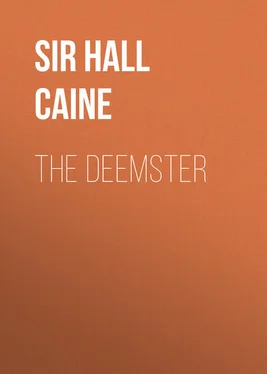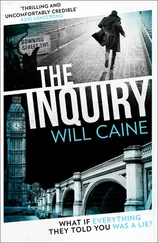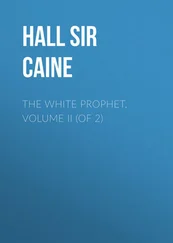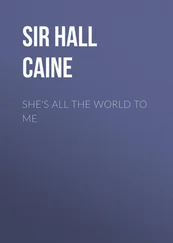Hall Caine - The Deemster
Здесь есть возможность читать онлайн «Hall Caine - The Deemster» — ознакомительный отрывок электронной книги совершенно бесплатно, а после прочтения отрывка купить полную версию. В некоторых случаях можно слушать аудио, скачать через торрент в формате fb2 и присутствует краткое содержание. ISBN: , Жанр: foreign_antique, foreign_prose, на английском языке. Описание произведения, (предисловие) а так же отзывы посетителей доступны на портале библиотеки ЛибКат.
- Название:The Deemster
- Автор:
- Жанр:
- Год:неизвестен
- ISBN:http://www.gutenberg.org/ebooks/35781
- Рейтинг книги:5 / 5. Голосов: 1
-
Избранное:Добавить в избранное
- Отзывы:
-
Ваша оценка:
- 100
- 1
- 2
- 3
- 4
- 5
The Deemster: краткое содержание, описание и аннотация
Предлагаем к чтению аннотацию, описание, краткое содержание или предисловие (зависит от того, что написал сам автор книги «The Deemster»). Если вы не нашли необходимую информацию о книге — напишите в комментариях, мы постараемся отыскать её.
The Deemster — читать онлайн ознакомительный отрывок
Ниже представлен текст книги, разбитый по страницам. Система сохранения места последней прочитанной страницы, позволяет с удобством читать онлайн бесплатно книгу «The Deemster», без необходимости каждый раз заново искать на чём Вы остановились. Поставьте закладку, и сможете в любой момент перейти на страницу, на которой закончили чтение.
Интервал:
Закладка:
The carol the rivals were about to sing contained some thirty verses. It was an ancient usage that after each verse the carol singers should take a long stride toward the communion. By the time the carol of "Bad Women" came to an end the carol singers must, therefore, be at the opposite end of the church.
There was now a sublime scorn printed on the features of Mr. Quirk. As for Hommy-beg, he looked, at this last instant, like a man who was rather sorry than otherwise for his rash adversary.
"The rermantic they're looking," whispered a girl in the gallery to the giggling companion beside her.
Expectation was at its highest when Hommy-beg thrust his hand into his pocket and brought out the printed copy of the carol. Hommy unfolded it, glanced at it with the air of a conductor taking a final look at his score, nodded his head at it as if in approval, and then, with a magnanimous gesture, held it between himself and Mr. Quirk. The schoolmaster in turn glanced at it, glanced again, glanced a third time at the paper, and up into the face of Hommy-beg.
Anxiety was now on tiptoe. "Hush, d'ye hear, hush," whispered Danny from his pew; "hush, man, or it's spoiling it all you'll be, for sure."
At the moment when Mr. Quirk glanced into the face of Hommy-beg there was a smile on that countenance. Mr. Quirk mistook that smile. He imagined he saw a trick. The schoolmaster could read, and he perceived that the carol which the gardener held out to him was not the carol for which he had been told by Master Danny to prepare. They were, by arrangement, to have sung the English version of "Bad Women." This was the Manx version, and though the metre was the same, it was always sung to a different tune. Ah! Mr. Quirk understood it all! The monster wanted to show that he, James Quirk, schoolmaster, could only sing one carol; but, as sure as his name was Jemmy, he would be equal with him! He could sing this Manx version, and he would. It was now Mr. Quirk's turn to smile.
"Aw, look at them – the two of them – grinnin' together like a pair of old gurgoils on the steeple!"
At a motion of the gardener's hand, intended to beat the time, the singers began. Hommy-beg sang the carol agreed upon – the English version of "Bad Women." Mr. Quirk sang the carol they held in their hands – the Manx version of "Bad Women." Neither heard the other, and to dispel the bare notion that either was singing seconds, each bawled at the utmost reach of his lung-power. To one tune Hommy-beg sang:
"Thus from the days of Adam
Her mischief you may trace."
And to another Mr. Quirk sang:
"She ish va'n voir ain ooilley
Son v'ee da Adam ben."
Such laughter! How the young women in the gallery lay back in their seats with hysterical shrieks! How the young fellows in the body made the sacred edifice ring with guffaws! But the singers, with eyes steadfastly fixed on the paper, heard nothing but each his own voice.
Three verses had been sung, and three strides made toward the communion, when suddenly the laughter and shouting of the people ceased. All eyes had turned toward the porch. There the Bishop stood, with blank amazement printed on his face, his head bare, and one hand on the half-opened door.
If a spectre had appeared the consternation had scarcely been greater. Danny had been rolling in his pew with unconstrained laughter, but at sight of the Bishop his candle fell from his hand and sputtered on the book-rail. The Bishop turned about, and before the people had recovered from their surprise he was gone. At the next moment everybody got up without a word and left the church. In two minutes more not a soul remained except Hommy-beg and Mr. Jemmy Quirk, who, with eyes riveted on the printed carol in their hands, still sang lustily, oblivious of the fact that they had no audience.
When Danny left the church that night it was through the lancet-window of the vestry. Dropping on the turf at the northeast of the church, he leaped the wall that divided the churchyard from a meadow on the north, and struck upon a path that went round to Bishop's Court by way of the cliff-head. The path was a long one, but it was lonesome, and its lonesomeness was no small merit in Danny's view that night. The Bishop must return to the Court by the highway through the village, and the Bishop must be in front of him.
The night was dark and dumb, and, laden with salt scent, the dank vapor floated up from the sea. Danny walked quickly. The deep boom of the waters rolling on the sand below came up to him through the dense air. Late as was the hour, he could hear the little sandpiper screaming at Orris Head. The sea-swallow shot over him too, with its low, mournful cry. Save for these sounds, and the quick beat of his own feet, all was still around him.
Beneath his stubborn bit of skepticism Danny was superstitious. He was full to the throat of fairy-lore and stories of witchcraft. He had learned both from old Billy Quilleash and his mates as they sat barking their nets on the shore. And that night the ghostly memories would arise, do what he might to keep them down. To banish them Danny began to whistle, and, failing to enliven himself much by that exercise, he began to sing. His selection of a song was not the happiest under the circumstances. It was the doleful ballad of "Myle Charaine." Danny sang it in Manx, but here is a stave of it in English:
"Oh, Myle Charaine, where got you your gold?
Lone, lone, you have left me here;
Oh, not in the Curragh, deep under the mold —
Lone, lone, and void of cheer."
He had come up to Bishop's Court on the sea-front, and there the Bishop's library stood out from the body of the old house, between the chapel porch and the kitchen offices. A light was in the library, and passing over the soft grass with the soft flight of a lapwing, Danny peered in at the curtainless window. The familiar room was empty. On the hearth a turf fire burned without flame, and bathed the book-encased walls in a rosy red. The Bishop's easy-chair, in its white covering, stood at one side of the ingle, his slippers in front of it; and beside it, on the little three-legged mahogany table, were the inkhorn and the long quill, and the Bishop's four-cornered library cap. The door stood ajar, and the two candles in the two brass brackets at each side of the fireplace were tipped by their extinguishers.
The Bishop had not returned; but the faint smile of triumph which at that thought rested like a ray of pale sunshine on Danny's face suddenly vanished. In a lad's vague way Danny now realized that it had not been merely because the night was dark and the road lonely that he had whistled and sung. He hung his head where he stood in the night, and as if by an involuntary movement, he lifted his cap and fumbled it.
At the next instant Danny was clambering up the angle of the wall to the lead flat that covered the projecting part of the library. From this lead flat there opened the window of his own bedroom, and in a moment he was striding through it. All was darkness within, but he needed no light to see his way in that room. He knew every crib and corner; the place where he kept his fishing lines, the nail from which his moth-net hung, the bottle on the drawers in which he had his minnows, and the can with the lid well down that contained the newts that were the terror of all the women in the house. If Danny had been as blind as old Kerry he could have found everything his room had in it, except, perhaps, his breeches, or his shirt, or his other coat, or that cap that was always getting itself lost, and of course no sight and no light would help a lad to find things like these.
Hardly had Danny taken a step into his room before he realized that some one had been there since he left it. Derry, his white-eyed collie, who had been lying on the bed, dropped on the floor, and frisked about him. "Down, Derry, down!" he whispered, and for a moment he thought it might have been Derry that had pushed open the door. But the dog's snout could not have turned down the counterpane of the bed, or opened the top drawer that held the fishing flies, or rummaged among the long rods in the corner. The counterpane lay double, the drawer stood open, the rods were scattered – some one had been there to look for him, and, not finding him, had tried to find a reason for his absence, and that some one had either come into the room in the dark, or – been blind.
Читать дальшеИнтервал:
Закладка:
Похожие книги на «The Deemster»
Представляем Вашему вниманию похожие книги на «The Deemster» списком для выбора. Мы отобрали схожую по названию и смыслу литературу в надежде предоставить читателям больше вариантов отыскать новые, интересные, ещё непрочитанные произведения.
Обсуждение, отзывы о книге «The Deemster» и просто собственные мнения читателей. Оставьте ваши комментарии, напишите, что Вы думаете о произведении, его смысле или главных героях. Укажите что конкретно понравилось, а что нет, и почему Вы так считаете.












